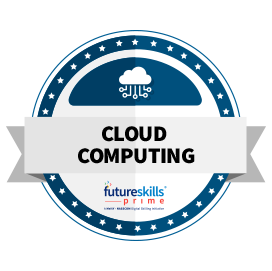Course Provider

What will you learn in this course?
- Make architectural decisions based on AWS architectural principles and best practices
- Leverage AWS services to make your infrastructure scalable, reliable, and highly available
- Leverage AWS Managed Services to enable greater flexibility and resiliency in an infrastructure
- Make an AWS-based infrastructure more efficient to increase performance and reduce costs
- Use the Well-Architected Framework to improve architectures with AWS solutions
Architecting on AWS
-
 Skill Type
Emerging Tech
Skill Type
Emerging Tech -
 Domain
Cloud Computing
Domain
Cloud Computing -
 Course Category
Deepskilling Course
Course Category
Deepskilling Course -
 Certificate Earned Joint Co-Branded Participation Certificate & Partner Completion certificate
Certificate Earned Joint Co-Branded Participation Certificate & Partner Completion certificate -
 Nasscom Assessment Coming Soon
Nasscom Assessment Coming Soon -
 Course Covered under GoI Incentive
Yes
Course Covered under GoI Incentive
Yes -
-
 Course Price
INR 43,500
Course Price
INR 43,500 -
 Course Duration
24 Hours
Course Duration
24 Hours
-
Why should you take this course?
- If you are someone who loves to solve business problems via technological tools then this role is for you.
- You will learn how to address specific business needs with the AWS services and products available to yourselves.
- You will work with business leaders and solve their long and short term problems with your IT solutions.
- You will build the bridge between a business problem and the technology solution and outline each of the phases and requirements required to make that solution work.
- A solutions architect also bridges communication between IT and business operations to ensure everyone is aligned in developing and implementing technical solutions for business problems.
- The process requires regular feedback, adjustments, and problem-solving in order to properly design and implement potential solutions.
- Aligning IT strategy with business goals has become paramount, and a solutions architect can help determine, develop, and improve technical solutions in support of business goals
Who should take this course?
This course is intended for solutions architects, solution-design engineers, developers seeking an understanding of AWS architecting and individuals seeking the AWS Solutions Architect-Associate certification.
Curriculum
Architecting on AWS builds on the essential Amazon Web Services (AWS) Cloud concepts and services. Each module provides a scenario with an architectural challenge to solve. In this course, you will cover how to build an AWS cloud infrastructure through presentations, demos, knowledge checks, discussions, and labs. The material is set to help participants compare features and explore best practices to architect resilient, secure, and highly available IT solutions on AWS. Participants have opportunities to practice applying the solutions through guided, interactive labs to ensure they are able to apply them in their business. The modules focus on account security, networking, compute, storage, databases, monitoring, automation, containers, serverless architecture, edge services, as well as backup and recovery.
In this course, students will:
- Identify AWS architecting basic practices.
- Explore using the AWS management tools (AWS Console, Command Line Interface [CLI], and AWS CloudFormation) in a lab environment.
- Examine the enforcement of account security using policies.
- Identify the elements that build an elastic, secure, virtual network that includes private and public subnets.
- Practice building an AWS core networking infrastructure.
- Determine strategies for a layered security approach to Virtual Private Cloud (VPC) subnets.
- Identify strategies to select the appropriate compute resources based on business use-cases.
- Practice building a VPC and adding an Amazon Cloud Compute (EC2) instance in a lab environment.
- Practice installing an Amazon RDS database instance and an Application Load Balancer in a VPC they create.
- Compare and contrast AWS Storage products and services based on business scenarios.
- Compare and contrast the different types of databases based on business needs.
- Practice building a highly available, auto-scaling database layer in a lab.
- Explore the business value of AWS monitoring solutions.
- Identify and discuss AWS automation tools that will help them build, maintain and evolve their infrastructure.
- Discuss network peering, VPC endpoints, gateway and routing solutions based on use-cases.
- Discuss hybrid networking configurations to extend and secure their infrastructure.
- Discuss the benefits of microservices as an effective decoupling strategy to power highly available applications at scale.
- Explore AWS container services for the rapid implementation of an infrastructure-agnostic, portable application environment.
- Identify the business and security benefits of AWS Serverless services based on business examples.
- Practice building a serverless infrastructure in a lab environment.
- Discuss the ways in which AWS edge services address latency and security.
- Practice building an Amazon CloudFront deployment with an Amazon S3 backend in a lab environment.
- Explore AWS backup, recovery solutions, and best practices to ensure resiliency and business continuity.
- Build a highly available and secure cloud architecture based on a business problem, in a project-based lab.
Tools you will learn in this course
Participants are going to explore AWS Services using AWS Management Console, Command Line Interface and CloudFormation in a Lab environment. The Participants will get familiarity on the below AWS Services-
- VPC Peering
- AWS Direct Connect
- Multi-VPC Patterns
- AWS VPN
- AWS VPC Endpoints
- Amazon Cognito
- AWS Organizations
- AWS Transit Gateway
- AWS CloudFormation
- AWS Systems Manager
- AWS OpsWorks
- AWS Elastic Beanstalk
- Amazon CloudFront
- Amazon ElastiCache
- Amazon Simple Queue System (SQS)
- Amazon Kinesis
- Amazon Simple Notification Service (SNS)
- Amazon Elastic Container Service (ECS)
- AWS API Gateway
- AWS Lambda
- AWS Step Functions
FAQs
Yes, as this is a fundamental course and covers concepts from scratch
Classroom training includes live classes with instructors who teach you in-demand cloud skills and best practices using a mix of presentations, discussion, and hands-on labs. You can ask questions, work through solutions in person, and get feedback from AWS-accredited instructors with deep technical knowledge.
You can go to cloudwizardconsulting.com and find the course under the COURSES section. Once you are on the page, you can then choose a date and book a slot



